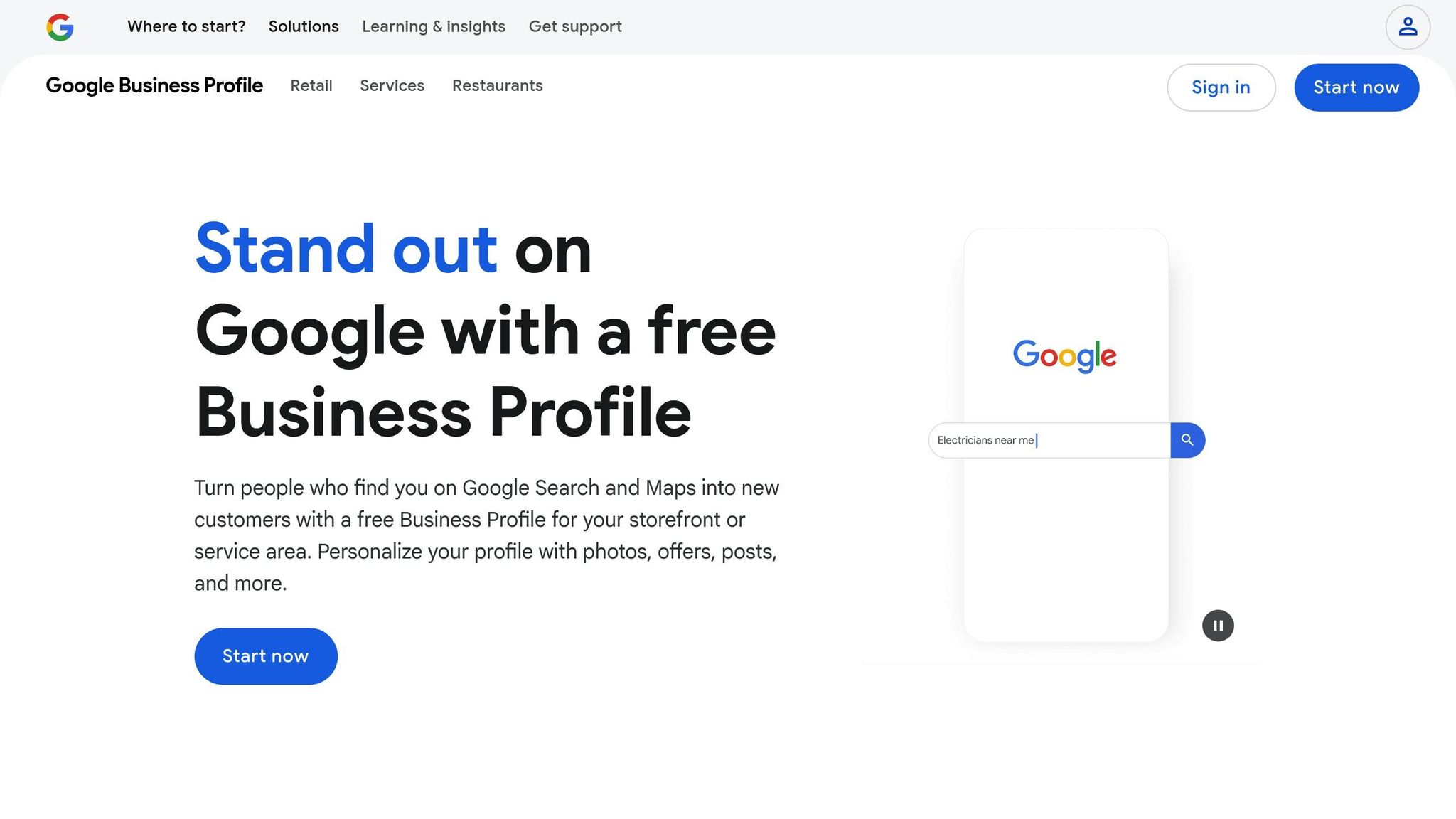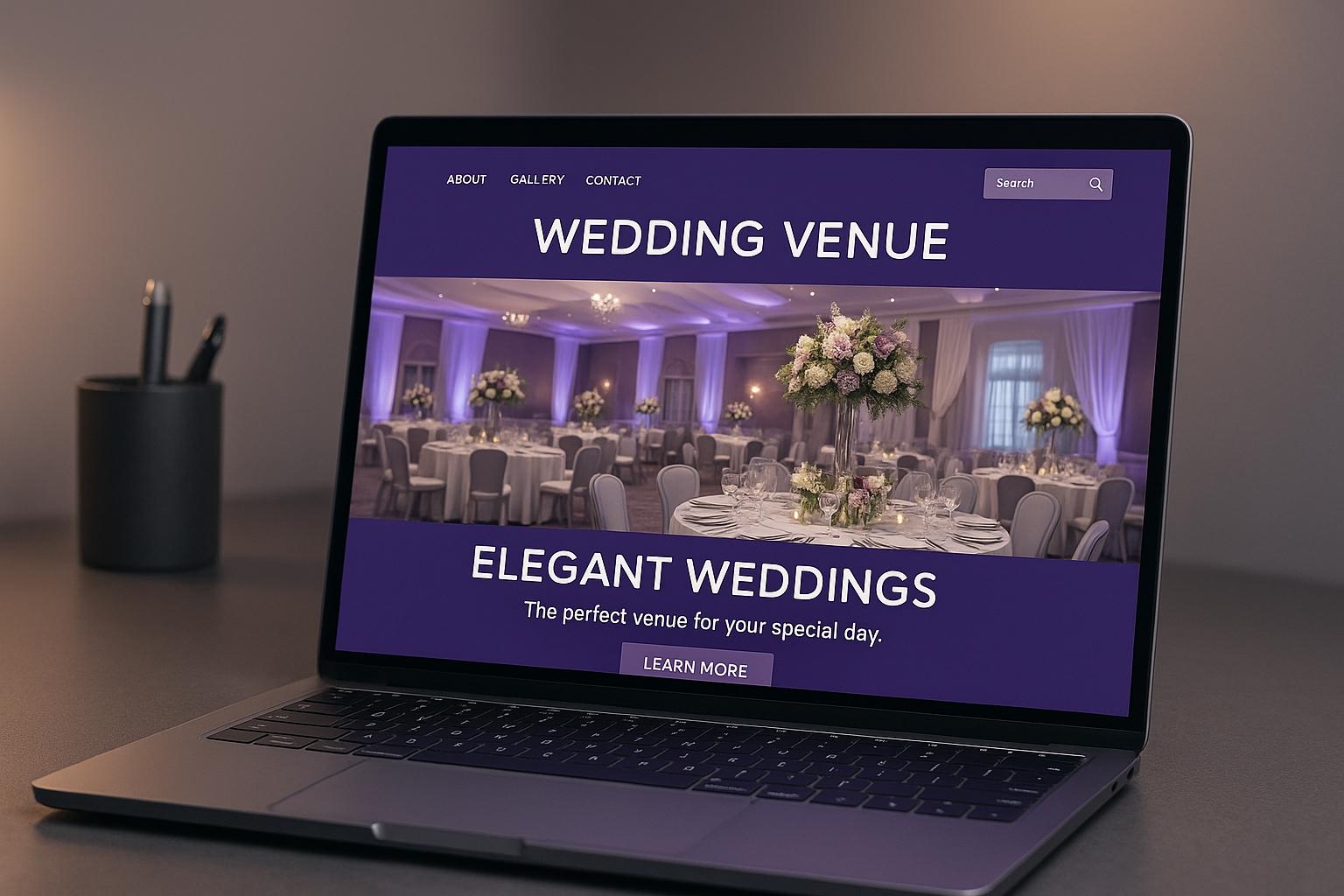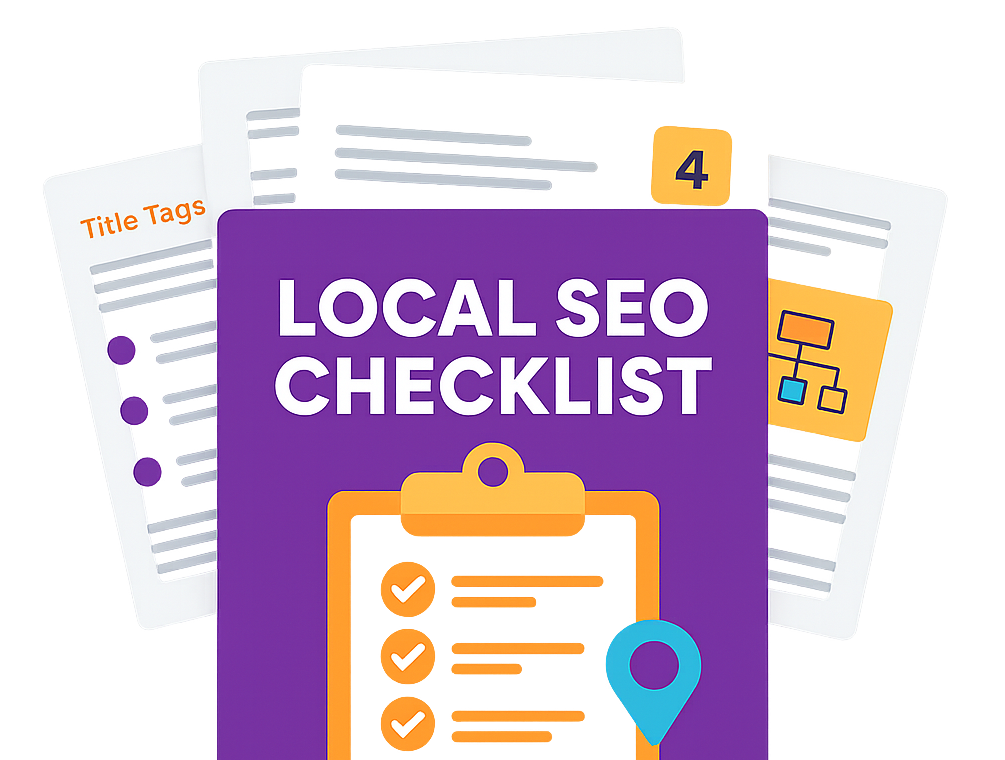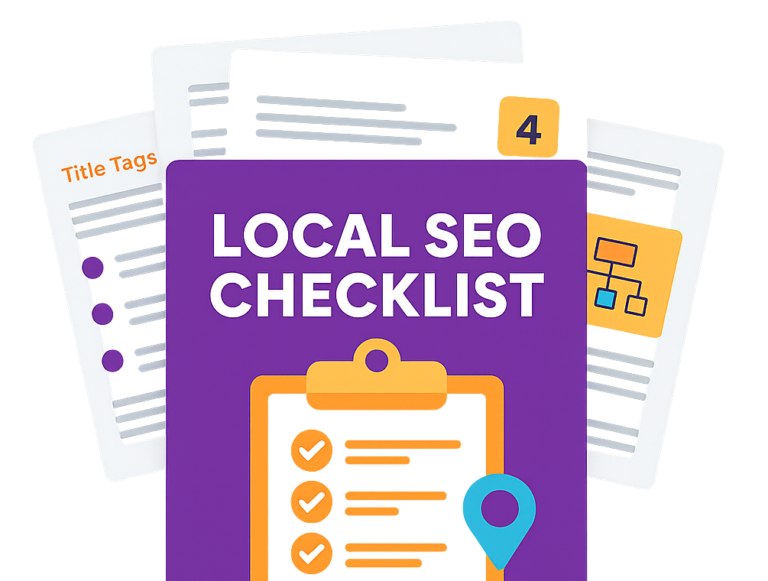Wedding venues often miss out on bookings due to common SEO errors that hurt their online visibility. With 90% of wedding planning happening online and 70% of couples relying on Google to find venues, fixing these mistakes can directly impact your revenue. Here’s a quick overview of the most frequent issues:
- Ignoring Local SEO: Failing to optimize for location-based searches like "wedding venues near me" reduces your visibility.
- Poor Keyword Targeting: Using overly generic or irrelevant keywords means missing out on potential clients.
- Keyword Stuffing: Overloading content with repetitive keywords can hurt rankings and turn visitors away.
- Neglecting Content Creation: Static websites with no updates lose search engine favor and fail to engage users.
- Poor Image Optimization: Large, uncompressed images slow down your site, frustrating visitors and lowering rankings.
- Inadequate Website Navigation: Confusing menus make it hard for users to find key information like pricing or availability.
- Hidden Contact Information: Hard-to-find phone numbers or forms discourage inquiries.
- Overlooking Technical SEO: Issues like broken links, slow load times, and missing meta tags hurt your rankings.
- Ignoring Mobile Optimization: With most couples browsing on smartphones, mobile-friendly design is a must.
- Failing to Leverage Reviews: Reviews boost trust and improve local SEO rankings but are often underutilized.
Why It Matters
Couples typically book venues early in their planning process, making strong online visibility critical. By addressing these issues, you can attract more inquiries, improve rankings, and stay competitive in the digital space.
For detailed solutions, read on to learn how to fix these mistakes and maximize your venue’s online presence.
1. Ignoring Local SEO
Local SEO is one of the most overlooked elements of wedding venue marketing, but it’s vital for attracting nearby couples searching for options like "wedding venues near me" or "barn wedding venues in [city name]." Without proper local optimization, your venue risks being invisible in these important searches. And the numbers make it clear why this matters.
In 2022, 98% of consumers searched for local businesses online, compared to 90% in 2019. Even more compelling, 88% of mobile searches for local businesses led to a call or visit within 24 hours, and 78% of location-based mobile searches resulted in an offline purchase. These stats highlight the direct connection between local searches and revenue opportunities.
The difference between local and general searches is striking. For example, 18% of local smartphone searches led to a purchase within a day, compared to just 7% of non-local searches. This gap underscores why local SEO isn’t optional – it’s essential for driving sales.
Optimize Your Google Business Profile

Your Google Business Profile is the cornerstone of local SEO. While many venues set up a profile, they often miss critical steps to fully optimize it. Start by keeping your business hours updated, especially during peak wedding seasons. Responding to all reviews – positive and negative – shows both Google and potential clients that your venue is active and attentive.
High-quality visuals also play a big role in improving your local search performance. Upload photos and videos showcasing different parts of your venue, from ceremony spaces to reception halls. Make sure to add descriptive captions with location-specific details, such as "outdoor ceremony space at [Venue Name] in downtown [City]", to boost your relevance in local searches.
Consistency Is Key: NAP Details
Your Name, Address, and Phone Number (NAP) should be consistent everywhere online. Whether it’s your website, Google Business Profile, wedding directories, or social media pages, even small inconsistencies – like using "Street" in one place and "St." in another – can confuse search engines and hurt your rankings.
Location-Specific Pages
To further strengthen your local SEO, create dedicated landing pages for the areas you serve. For example, if you draw clients from multiple cities or counties, develop pages optimized for searches like "wedding venues in [specific city]" or "rustic wedding venues near [landmark]." Including location names in meta titles and descriptions helps search engines understand your geographic focus.
Don’t Overlook Voice Search and Mobile Optimization
Voice search is becoming increasingly important, with 22% of voice queries focused on local information. Answer common questions like "What wedding venues are open on Sundays near me?" or "How much does a wedding venue cost in [your city]?" to capture these searches.
Additionally, mobile optimization is critical for local SEO success. Sixty-one percent of mobile users are more likely to contact a business with a mobile-friendly site. Ensure your website is easy to navigate on mobile devices, with clickable phone numbers and clear directions to your venue.
Advanced Local SEO Tactics
To monitor your progress, set up local rank tracking for keywords like "[your city] wedding venues" or "wedding venues near [local landmarks]." This helps you see how well your local SEO efforts are working.
Schema markup is another tool to enhance your visibility. Adding local business schema helps search engines better understand your location, hours, and services. Including review schema can also display star ratings in search results, which can encourage more clicks.
As couples increasingly begin their wedding venue search online – often before setting a date – local SEO ensures your venue is visible at the right time. By optimizing for local searches, you position your venue to connect with couples early in their planning process, giving you a competitive edge.
For more tips, check out our SEO for wedding venues guide.
2. Poor Keyword Targeting
Picking the wrong keywords is like putting up a billboard in a language no one understands – it might look good, but it won’t get the message across. Wedding venues often fall into this trap by targeting keywords that are too generic, overly competitive, or completely unrelated to how couples actually search for their perfect venue.
The impact? It’s immediate and costly. Showing up on the first page of search results is crucial for visibility and bookings. When venues target the wrong keywords, they’re left competing in the wrong arena and missing out on couples actively searching for exactly what they offer. By focusing on the right keywords, especially with a local SEO approach, you can ensure your venue is front and center for couples looking for specific features.
The Problem with Generic Keywords
Many venues make the mistake of chasing broad terms like "wedding venue" or "event space." While these might seem logical, they’re extremely competitive and don’t match how couples typically search. For instance, couples are more likely to use detailed phrases like "rustic barn wedding venue" or "outdoor wedding venue with catering."
"Your keywords and keyword phrases should reflect your differentiators and how couples would look for them in this venue search engine." – C&C Editors
Why does this matter? Google’s algorithm prioritizes relevance. If your content doesn’t align closely with the keywords you’re targeting, your site won’t be seen as valuable for those searches. This can leave your venue virtually invisible to potential clients.
Understanding Search Intent
Good keyword targeting starts with understanding how couples think and search. For example, someone searching for a "New York City rooftop wedding" has different needs than someone looking for a "New York City museum wedding." Both are wedding-related, but each reflects a unique preference and expectation.
Couples often use long-tail keywords – phrases that are three to five words long – because they’re looking for something specific. A search like "intimate wedding venue under $5,000" shows someone much closer to booking than someone using a vague term like "wedding venue." This insight is key to crafting a keyword strategy that resonates with what couples are actually looking for.
Practical Keyword Research for Wedding Venues
Start by brainstorming how couples might describe your venue’s standout features. Are you a historic mansion, a modern loft, or a waterfront property? These unique traits should form the core of your keyword strategy.
Location-based keywords are a must. Couples usually search within a specific area, so include your city, region, and nearby landmarks in your keywords. For example, phrases like "wedding venue in Philadelphia, PA" or "barn wedding venue near downtown" can help you capture local searches effectively. Similar to local SEO tactics, incorporating these location-specific terms refines your audience targeting.
Use tools like Google Keyword Planner to check search volumes for your chosen phrases, and SEMRush to identify keywords with mid-level search volumes (100–500 searches) and low difficulty scores (0–50). These "sweet spot" keywords give you a better shot at ranking without competing with massive wedding industry websites.
For more tips on optimizing your venue’s SEO strategy, check out Bare Digital’s guide on SEO for wedding venues at https://www.bare-digital.com/seo-for-wedding-venues/.
The Local Advantage
Local businesses have a leg up with Google, which makes location-based keyword targeting a must for wedding venues. By adding local specifics to your keywords, you can connect with couples searching in your area instead of competing on a global scale.
Think about layering in local details like neighborhoods, landmarks, zip codes, or phrases like "near me" or "nearby." A 2023 study by Sterling Sky showed that optimizing website content for these terms can lead to noticeable improvements in rankings.
Avoiding Keyword Overload
Stuffing your content with too many keywords can backfire, making your site look untrustworthy to both search engines and potential clients. Instead, focus on weaving keywords into your content naturally.
Write the way couples would search. For example, instead of awkwardly repeating "rustic barn wedding venue", you might say, "Our venue offers the perfect rustic barn setting for your dream wedding." This keeps your content readable while still targeting your keywords.
Keeping Up with Search Trends
Search behavior isn’t static – what worked last year might not work today. Regularly review your keyword performance and tweak your strategy to match seasonal trends and shifting search habits. Staying adaptable will help you stay visible to couples as their search preferences evolve.
3. Keyword Stuffing
If poor keyword targeting is like speaking a different language, keyword stuffing is like shouting the same word repeatedly until no one wants to listen anymore. Wedding venues often fall into this trap by overloading their pages with terms like "wedding venue" in hopes of boosting rankings. Unfortunately, this approach makes the content feel robotic and unappealing, turning potential clients away and risking penalties from search engines.
Keyword stuffing refers to the excessive and unnatural use of keywords to manipulate search engine rankings. However, updates to Google’s algorithms – like Panda, Hummingbird, and BERT – are designed to penalize this tactic. Instead, they reward websites that prioritize natural, high-quality content that offers genuine value. Let’s dive into how you can adjust your content to engage users and improve rankings.
The Real Cost to Your Business
Beyond search engine penalties, keyword stuffing can seriously harm your business by driving visitors away. When couples land on a page overloaded with awkward, repetitive phrases, they’re likely to leave almost immediately. This quick exit sends a negative signal to search engines, suggesting your content isn’t helpful, which can hurt your local search rankings.
These consequences make it clear: prioritizing quality content is essential for both user engagement and SEO success.
Writing That Actually Converts
To turn website visitors into bookings, your content needs to be engaging and informative while using keywords sparingly and strategically. Focus on creating conversational, helpful content that addresses what couples really want to know about your venue.
For example, instead of overusing the exact phrase "rustic barn wedding venue", try incorporating variations like "countryside wedding location", "barn-style event space", or "rural wedding setting." This approach not only keeps your content enjoyable but also helps search engines understand the topic without overloading on one keyword.
The 2% Rule and Beyond
Aim to keep keyword density below 2%. For instance, in a 500-word piece, avoid using the same keyword more than 10 times. Instead of cramming keywords into the body text, place them strategically in meta titles, descriptions, URLs, image alt text, and subheadings.
Long-Form Content Advantage
Longer content – around 1,500 words – gives you more room to naturally incorporate keywords while providing detailed information about your venue. This also allows you to include long-tail keywords, which are more specific phrases that align with what couples are searching for. For example, instead of forcing "wedding venue" into every sentence, you could naturally include phrases like "outdoor ceremony space with mountain views" or "reception hall with in-house catering options."
Quality Over Quantity
When your content focuses on answering the questions couples care about – like capacity, pricing, available dates, and venue features – it will naturally include relevant keywords. Google’s BERT update emphasizes the importance of context, so write in a way that feels natural and conversational. The goal isn’t to trick search engines; it’s to create content so valuable and well-written that both visitors and algorithms recognize its worth.
For more tips on improving your venue’s online presence, check out our full guide on SEO for wedding venues.
4. Neglecting Content Creation
Many wedding venues put up static websites and then forget about them. This lack of updates can seriously hurt both search engine visibility and audience engagement. Did you know that 93% of online experiences begin with a search engine? On top of that, 80% of couples rely on search engines to find their wedding vendors. Without regular updates and fresh content, a venue risks fading into the background, missing out on potential clients and engagement opportunities.
The SEO Performance Impact
Search engines favor websites that show consistent activity. If your site stays stagnant for months, it might signal to search engines that your business is inactive or less relevant compared to competitors who are frequently updating their content. Regular updates also give you the chance to incorporate local keywords naturally and address the specific questions couples in your area are asking.
Content Strategies That Generate Inquiries
To keep your venue top-of-mind for couples, focus on content that highlights what makes your venue stand out while showcasing your local knowledge.
- Real Wedding Features: Share detailed posts about recent weddings held at your venue. Include specifics like the season, guest count, décor, and how your team helped bring the couple’s vision to life. This kind of content not only inspires future clients but also incorporates long-tail keywords like "rustic barn venue with outdoor ceremony space" or "reception hall with customizable catering options."
- Local Planning Guides: Create in-depth guides that help couples plan their weddings in your area. Include tips on choosing local vendors, navigating seasonal factors, and incorporating unique local traditions. These guides can boost your rankings for searches like "wedding planning in [your city]" while positioning your venue as a trusted local expert.
The Monthly Content Commitment
To stay competitive, aim to add new content or refresh existing pages at least once a month. A consistent content calendar can include a mix of real wedding features, planning advice, seasonal updates, and venue news.
Consider creating dedicated pages for each type of service you offer, such as ceremonies, receptions, corporate events, or other celebrations. These pages not only improve your chances of ranking for specific searches but also showcase the full range of what your venue can provide.
Local Search Benefits
Incorporating local landmarks, attractions, and community features into your content can significantly improve your visibility in local searches. Consumers are increasingly turning to online searches to find local services, so localized content is key.
For example, create Q&A-style posts that address common local concerns like weather, guest transportation, or venue regulations. Use local keywords to ensure these posts resonate with your audience and address their specific needs. Covering seasonal details and logistical challenges unique to your area can make your content even more relevant.
For more detailed strategies on improving your venue’s online presence, check out our complete guide on SEO for wedding venues.
5. Poor Image Optimization
When it comes to wedding venues, visuals are everything. Stunning photos can captivate potential clients, but if those images aren’t optimized, they can do more harm than good. Large, uncompressed files can slow your site dramatically, causing frustrated visitors to leave before they even get a chance to see your venue. With 75% of internet users sticking to results on Google’s first page, a sluggish website can easily knock you out of the running.
The Performance Hit from Unoptimized Images
Couples searching for wedding venues want instant results. If your image galleries take too long to load, they may lose interest – and your Google rankings could take a hit, too. Switching to WebP images can make a big difference, as they load up to 34% faster than standard JPEGs. Speed matters, not just for user experience but also for staying competitive online.
Easy Steps to Optimize Venue Images
The good news? You don’t have to be a tech wizard to optimize your images. Start by compressing them using tools like TinyPNG or JPEGmini. Choose the right format for each type of image: JPEG for photos, PNG for graphics, and convert key visuals to WebP for faster loading. This keeps your photos looking sharp while improving site speed.
Another tip: resize images to a maximum of 1,500 pixels on the longest side before uploading them. While high-resolution files might be great for print, they’re overkill for the web. Smaller images load faster and still showcase your venue beautifully.
Local Search Benefits of Image SEO
Optimizing images isn’t just about speed – it can also boost your local search visibility. Start by giving your image files descriptive names that include keywords and your location. For example, instead of “IMG_1234.jpg,” try something like “elegant-wedding-venue-chicago-reception.jpg.” This makes it easier for search engines to understand and rank your images.
Alt text is another must. Write natural, descriptive alt text that includes relevant keywords, like: “Elegant outdoor wedding setup at Willow Creek Estate in Austin, Texas.” This not only helps search engines but also ensures accessibility for visually impaired users.
Adding captions can also make a big impact. A caption like “Our outdoor terrace offers breathtaking sunset views and seats up to 150 guests” provides useful details for couples while reinforcing important keywords.
Technical Tweaks That Improve Performance
To take things further, enable lazy loading so images only load as users scroll down the page. This speeds up initial load times, which is especially helpful for image-heavy pages.
Make sure your site uses responsive design, so your images look great on any device. With many couples browsing venues on their phones, it’s essential that your photos load quickly and display perfectly, whether on a desktop or a smartphone.
Finally, don’t forget to credit your photographers by linking back to their websites. This strengthens professional relationships and can even earn you valuable backlinks, which help with SEO.
6. Inadequate Website Navigation
Think of your website’s navigation as the signage at your venue. If guests can’t figure out where to go, they’ll leave frustrated. The same applies online – confusing navigation can drive potential clients away before they even get a chance to admire your beautiful spaces. In fact, users form an impression of your site in just 50 milliseconds, and poor navigation often leaves them clicking over to your competitors.
How Poor Navigation Hurts Your SEO
When visitors can’t quickly find what they’re looking for, they leave your site – fast. This sends a clear message to Google: your website isn’t meeting users’ needs. As a result, search engines may struggle to properly crawl and index your pages. This means key details like your venue photos, pricing, or availability might not even show up in search results.
But the damage doesn’t stop there. A confusing site structure often leads to higher bounce rates and fewer conversions. Imagine someone searching for "wedding venues near me." They land on your site, but if they can’t immediately locate your location, capacity, or contact info, they’ll move on to the next option. These issues often stem from specific navigation mistakes that venues unknowingly make.
Common Navigation Mistakes Wedding Venues Make
One big misstep is using vague or overly creative labels in your menu. For example, calling your pricing page "Investment" might sound fancy, but it can confuse couples who just want clear, straightforward information.
"By using vague navigation labels, we’ve proven that you are creating space for failure and missing an opportunity to create clarity around your brand and offering… If [users] are failing to find the content they’re looking for, they will go to your competitors or somewhere else to find it." – Hilary Basch, Senior User Experience Designer, Tank Design
Another common problem? Overloading your menu. Some venues try to cram every service and amenity into their main navigation. While this might seem helpful, it often overwhelms visitors and makes it harder to find basic details like your location or how to book a tour.
Crafting Navigation That Drives Bookings
Your navigation should guide visitors effortlessly to the information they need. Stick to essential categories like "Venue Spaces", "Pricing & Packages", "Gallery", "Availability," and "Contact." Use clear, descriptive labels so visitors know exactly what to expect when they click.
To keep things tidy, use drop-down menus or breadcrumbs to organize related content. For example, under "Venue Spaces", you could include subcategories like "Ceremony Sites", "Reception Halls," and "Outdoor Areas." This approach keeps your menu clean while making detailed information easy to find.
Mobile Navigation Matters
Don’t forget about mobile users – after all, many couples will browse your site on their phones. Hamburger menus are a great way to save screen space while keeping key pages accessible. Make sure menu items are large enough to tap easily, and prioritize essential details like contact info and booking forms.
Regularly test your mobile navigation yourself. Try finding your address, checking pricing, or submitting a contact form. If it’s not quick and simple for you, it won’t be for your clients either.
Use Data to Fine-Tune Your Navigation
Google Analytics is a powerful tool for identifying navigation issues. Look for pages with high bounce rates or low time-on-page stats – these often signal that visitors are struggling to find what they need. For instance, if many users leave your pricing page quickly, it could mean they’re not finding the details they’re looking for, or your navigation isn’t guiding them to the next step.
If your site has a search bar, pay attention to what users are searching for. Frequent searches for terms like "contact" or "pricing" suggest these items aren’t easy to locate in your menu. Use this data to reorganize your navigation and make important information more prominent.
For more tips on improving your venue’s digital presence, including navigation strategies, check out our full guide on SEO for wedding venues.
7. Burying or Complicating Contact Information
Your contact information is the bridge between curious couples and confirmed bookings. If it’s hard to find, you’re practically inviting them to check out your competitors instead. When potential clients can’t quickly locate a phone number, email, or booking form, they won’t stick around – they’ll move on to venues that make communication easier. This not only frustrates users but can also hurt your site’s SEO.
According to KoMarketing’s 2023 usability study, 44% of website visitors will leave if they can’t find visible contact information or a phone number. For wedding venues, this means fewer inquiries, fewer bookings, and lost revenue.
How Hidden Contact Details Hurt Your SEO
Search engines rely on clear, consistent contact details to verify your business’s legitimacy. If your Name, Address, and Phone number (NAP) are hidden or inconsistent, it signals low credibility, which can damage your local SEO rankings.
Here’s why it matters: Google uses your contact information to populate local search results and Google Maps listings. If your details are hard to find or missing entirely, you’re less likely to show up when couples search for "wedding venues near me." Even worse, if your website’s contact details don’t match your Google My Business listing, it creates confusion for search engines and can seriously harm your local visibility.
Common Contact Information Mistakes
Some venues unintentionally create obstacles by:
- Hiding contact details behind multiple clicks or requiring long forms.
- Using only a generic contact form without providing a phone number or email address.
- Placing contact information on a single "Contact Us" page that’s hard to find or not prominently linked.
These practices frustrate couples, especially those who want quick answers about availability, pricing, or services. Many prefer to speak directly with a venue coordinator, and if they can’t find a way to do that, they’ll move on to a venue that makes it easier.
Making Your Contact Information Work for You
Clear and accessible contact details are essential for turning website visitors into paying clients. To make it easy for couples to reach you:
- Display your phone number, email, and address on every page – ideally in the header or footer.
- Use clickable phone numbers and email links so mobile users can contact you with a single tap.
- Create a dedicated contact page with a friendly introduction, a simple inquiry form (ask only for essentials like name, email, phone, preferred date, and message), and clear calls to action like "Schedule a Tour" or "Check Availability."
- Add a Google Maps embed to show your location – helpful for both users and search engines.
Short forms work best. The more fields you add, the more likely couples are to abandon the form, especially if they’re just starting to explore their options.
Boosting Local Search Visibility
Accessible contact information doesn’t just help couples – it also boosts your local search rankings. When search engines can easily verify your business details, you’re more likely to appear in local results and Google Maps.
To maximize local visibility:
- Ensure your NAP details are consistent across your website and online listings.
- Use structured data markup for your contact info to help search engines display your details accurately in search results.
For more tips on optimizing contact details and improving your local SEO, check out our SEO for wedding venues guide.
sbb-itb-55d8047
8. Overlooking Technical SEO
Even with flawless content and navigation, technical glitches can quietly undermine your site’s SEO performance. No matter how visually stunning your website is, if search engines can’t crawl, index, or rank it properly, potential clients won’t find you. And that means fewer couples discovering your venue online. Fixing technical SEO issues is the key to transforming a great-looking site into one that ranks well.
"All it means is fixing issues that are present on your site, ruin the user experience and cause you to lose rankings." – Brian Gareth, Blogger, WebCEO
Some common culprits include slow-loading pages, broken links, missing meta tags, and poor mobile optimization. These issues not only frustrate users but also signal to search engines that your site isn’t reliable or user-friendly.
How Technical Problems Hurt Your Bookings
When your site takes too long to load or contains broken links, visitors get annoyed and leave. Couples planning their wedding are looking for a seamless, professional experience, and they’ll move on to competitors if your site doesn’t deliver. Did you know that if your site takes more than 3 seconds to load, you could be losing a significant chunk of potential bookings?
Technical issues also impact your visibility in local search results. Google favors websites that provide a smooth user experience, and problems like missing alt tags or broken links can hurt your rankings. For instance, without alt tags, search engines can’t "see" your venue photos, and broken links create dead ends that frustrate users and search engine bots alike.
Common Technical SEO Issues for Wedding Venues
- Slow loading times: Venue websites often feature high-resolution images and detailed galleries, but these large files can significantly slow down loading times, especially on mobile devices.
- Broken links: Updating your website or changing page structures can lead to broken links, which can cost you bookings if they lead to crucial pages like pricing or availability.
- Missing meta tags: Without proper title tags and meta descriptions, search engines struggle to understand your content. This can prevent your venue from appearing in relevant searches like "outdoor wedding venues in [your city]."
Easy Technical Fixes That Make a Difference
Start by using tools like Google PageSpeed Insights to identify what’s slowing your site down. Compress images (WebP format works great), enable Gzip compression, and set up browser caching to improve load times.
For broken links and crawl errors, turn to Google Search Console. Replace broken links with working ones or remove them entirely. If an outbound link is broken, find a similar resource to link to instead.
Every page on your site should have a unique title tag and meta description. Include your venue name and location in the title tags, and use meta descriptions to encourage couples to click through.
Also, check that all technical tags – like alt text, title tags, and meta descriptions – are complete. These small updates can strengthen your SEO and improve your rankings.
Boosting Mobile and Local Search Performance
Make sure your website uses responsive design so it works seamlessly across devices. Submit an XML sitemap via Google Search Console and ensure your robots.txt file allows search engines to crawl important pages.
Add structured data markup for your business details, such as your venue name, address, phone number, and hours. This helps search engines display your information accurately in local search results and can even lead to rich snippets, making your listing stand out.
Finally, if your site isn’t already using HTTPS, it’s time to make the switch. This security protocol is not only a ranking factor but also reassures couples that their personal information is safe when they fill out inquiry forms.
9. Ignoring Mobile Optimization
Even the most breathtaking venue photos and well-crafted service details are pointless if they don’t display properly on mobile devices. With more than half of wedding planning happening on smartphones, a website that’s not mobile-friendly might as well be invisible to a significant portion of your audience. Google knows this too, which is why mobile-friendly sites are ranked higher in search results.
But it’s not just about rankings. A poorly optimized mobile site can cost you actual bookings. Couples expect your website to load fast and look great on their phones. If it doesn’t, they’ll move on to a venue with a better online experience.
Why Mobile Optimization Matters for Bookings
The data is clear. A one-second delay in loading time can reduce conversions by 7%. For wedding venues, this could mean fewer inquiries, fewer phone calls, and ultimately fewer bookings. Google’s mobile-first indexing means that if your mobile experience is subpar, your entire SEO strategy takes a hit. This is especially critical when you consider that 97% of people research local businesses online, with much of that happening on mobile devices.
Local search is another key factor. In 2022, 98% of consumers found local businesses online, compared to 90% in 2019. When couples search for “wedding venues near me” on their phones, your site needs to not only appear in those results but also function flawlessly to keep their attention.
Key Steps for Mobile Optimization
Start with responsive design. This ensures your site adapts seamlessly to any screen size, so photos, pricing, and contact details display properly.
Pay attention to loading speed. High-resolution gallery images and detailed descriptions can slow down your site on mobile. Compress your images and consider using WebP format for faster loading. Enabling browser caching can also help returning visitors access your site more quickly.
Make sure buttons and links are easy to tap. A tiny “Book Now” button that’s hard to click on a small screen is a dealbreaker. Use clear, legible fonts and ensure text is large enough to read without zooming in.
Boosting Local Search on Mobile
Beyond responsive design, strengthen your local presence by keeping your Google My Business listing up-to-date. Mobile users often want quick access to call your venue or get directions, so make these actions effortless.
Test your website regularly across different mobile devices and browsers. What looks great on one phone might not work well on another. Use tools like Google’s Mobile-Friendly Test to spot and fix issues.
Don’t overlook Core Web Vitals, which measure loading speed, interactivity, and visual stability. These metrics directly impact both your search rankings and how users perceive your site. A fast, stable site creates a polished impression and encourages couples to reach out.
For a deeper dive into optimizing your wedding venue’s mobile experience, check out our SEO strategies for wedding venues, which cover mobile and local search in detail.
10. Failing to Leverage Reviews and Social Proof
Incorporating reviews and social proof into your SEO strategy is a critical step in building your venue’s online credibility. Even the most picturesque venue needs testimonials to establish trust with couples planning their big day. Reviews aren’t just an optional extra – they’re powerful tools for boosting both SEO and conversions.
Consider this: 77% of millennials rely on online reviews, and 60% of couples actively read them. In fact, 80% say reviews are "very important" when selecting a venue. With couples typically spending 30% to 50% of their wedding budget on the venue, they need reassurance that their investment is in good hands.
How Reviews Help Your SEO
Google sees reviews as fresh, user-generated content that signals your business is active and reliable. These reviews often include key search terms like "stunning wedding venue" or "excellent service", which help improve your search rankings.
Reviews are especially impactful for local SEO. When couples search for "wedding venues near me", Google looks at the number, quality, and recency of your reviews to decide which venues to prioritize. For instance, a venue with 50 recent five-star reviews is likely to rank higher than one with just a handful of outdated reviews, even if other SEO factors are similar. This not only boosts your visibility but also builds trust, increasing the chances of couples choosing your venue.
Why Trust Matters for Wedding Venues
Building trust is essential in the wedding industry. Without a steady flow of testimonials highlighting successful weddings, potential clients might assume you’re inexperienced, unreliable, or hiding something.
"Social proof is one of the most powerful tools in your marketing arsenal. Couples want to trust their big day to a venue with proven success, and highlighting positive reviews builds that trust." – Mizan Potgieter, Marketing Specialist at WeddingDates
For couples, reviews and photos are the top factors when selecting vendors. If your venue can showcase glowing testimonials and stunning visuals, you’re already ahead of the game.
How to Collect Reviews Effectively
To make reviews a consistent part of your strategy, you need a system. Start by asking couples for feedback about two weeks after their wedding. This timing captures their excitement while giving them enough time to reflect on their experience.
- Create a dedicated page on your website with direct links to review platforms like Google My Business, The Knot, and WeddingWire. Include this link in follow-up emails and thank-you notes.
- Send a simple thumbs up/thumbs down email to gauge satisfaction. Happy clients can be encouraged to leave public reviews, while dissatisfied ones give you a chance to address issues privately.
Making Reviews Work for You
Once you’ve collected reviews, put them to work. Dedicate a section of your website to testimonials and keep it updated with fresh feedback. Highlight specific details from reviews that address common concerns, like service quality or venue flexibility.
- Share reviews on social media and your website to amplify their reach. Add them to Instagram Highlights for easy access by potential clients.
- Encourage video testimonials for a personal touch. Seeing a couple talk about their wedding experience can create a connection that written reviews can’t match. These videos are perfect for your homepage or social media channels.
Managing Your Reviews
Engaging with reviews – both positive and negative – is crucial. Respond to all feedback to show you’re attentive and value your clients’ opinions. Thoughtful responses to negative reviews can even enhance your reputation by demonstrating how you handle challenges.
"Couples want evidence of your value in the form of reviews and testimonials from your happy clients. Make sure those reviews are recent and that you have lots of them." – Ciara Crossan, Founder and CEO at WeddingDates
Comparison Table
Making smart choices about tools and strategies can significantly boost your venue’s SEO. Whether you’re exploring local SEO tools, deciding on image formats, or fine-tuning mobile optimization, understanding these options can help you avoid missteps and improve your online visibility. Below, we break down specific tools and techniques to guide your decisions.
Local SEO Tools for Wedding Venues
If you’re just starting out, tools like Moz Local offer a straightforward solution with automated listing management for $14/month per location – perfect for single-location venues. Whitespark specializes in citation building, starting at $20 per campaign, while Google Business Profile Manager is a free option offering direct control over your Google listing. For venues managing multiple locations, EmbedSocial starts at $9 for two locations and includes robust review aggregation features. Here’s a quick comparison to help you decide:
| Tool | Starting Price | Best For | Key Features |
|---|---|---|---|
| BrightLocal | $39/month | Comprehensive local SEO audits | Citation audits, review monitoring, competitor analysis |
| Moz Local | $14/month per location | Automated listing management | Centralized listings, duplicate suppression, instant updates |
| Whitespark | $20 per campaign | Citation building and GBP audits | Local Citation Finder, review generation, rank tracking |
| Google Business Profile Manager | Free | Direct Google listing control | Business details editing, review responses, performance insights |
| EmbedSocial | $9 for 2 locations | Multi-location GBP management | Review aggregation, post scheduling, performance insights |
Image Format Optimization
Choosing the right image formats can make a big difference in your website’s performance. Modern formats like WebP offer smaller file sizes without sacrificing quality, which helps improve page load speed – a critical factor for SEO. However, JPEG and PNG often perform better in Google Image Search indexing, making them ideal for key images on your site.
| Format | Compression | File Size | Transparency Support | Image Search Indexing |
|---|---|---|---|---|
| JPEG | Lossy | Moderate | No | Better |
| PNG | Lossless | Large | Yes | Better |
| WebP | Lossy & Lossless | Small | Yes | Worse |
| AVIF | Lossy & Lossless | Smaller | Yes | Worse |
For the best results, use JPEG or PNG for your main images to maximize search visibility. Supporting images can leverage WebP or AVIF to improve page speed.
Mobile Optimization Strategies
Mobile performance plays a crucial role in SEO, especially since over half of all web traffic comes from mobile devices. Ensuring your website is mobile-friendly not only enhances user experience but also boosts your search rankings. Responsive design is a must – it allows your website to adjust seamlessly to any screen size.
Pairing responsive design with modern image formats like WebP and techniques like lazy loading (which loads images only as users scroll) can significantly improve page speed. Google’s Core Web Vitals also emphasize the importance of mobile optimization. With the upcoming shift from First Input Delay (FID) to Interaction to Next Paint (INP) in March 2024, focusing on mobile performance is more critical than ever.
For additional tips, check out our in-depth SEO for wedding venues guide.
Conclusion
Avoiding these ten SEO mistakes can make a huge difference in your venue’s online visibility, helping you connect with couples during their most critical planning moments. With over 90% of Google users never venturing past the first page – and more than half of all clicks going to the top three results – fixing these common SEO issues is key to staying competitive.
Effective SEO doesn’t just improve rankings; it also lessens your dependence on pricey directories by driving organic, qualified leads. When couples searching for venues discover yours because it meets their specific needs, you’re not just marketing smarter – you’re building a foundation for long-term growth.
Start with the basics: claim and optimize your Google Business Profile, dig into keyword research, and make sure your website delivers a seamless mobile experience. Go further by crafting content that directly answers couples’ questions and highlights your venue’s standout features with stunning photos and virtual tours.
These strategies can set your venue apart in the crowded digital space. Ready to step up your SEO game? Check out our SEO for wedding venues guide for actionable tips to boost your visibility. Couples are searching for their dream venue online right now – make sure yours is the one they find first.
FAQs
How can wedding venues optimize their Google Business Profile to improve local SEO?
How Wedding Venues Can Improve Local SEO
If you’re looking to improve your local SEO, start with your Google Business Profile. Make sure every detail is accurate and up-to-date – this includes your business name, address, phone number, and selecting the most fitting categories. Consistency is crucial, so double-check that this information matches across all platforms.
Another important step? Keep your profile fresh. Upload high-quality photos of your venue regularly to showcase its appeal. And don’t underestimate the power of client feedback – encourage satisfied couples to leave glowing reviews. These reviews not only build trust but also help boost your profile in local search rankings.
Lastly, use relevant keywords in your business description and service listings. This helps search engines connect your venue with what potential clients are searching for. Stay active by responding to reviews and updating your profile often. These small but effective actions can make a big difference in increasing your visibility and drawing in more local clients.
How can wedding venues use customer reviews to improve their SEO strategy?
How Customer Reviews Can Boost Your Wedding Venue’s SEO
Integrating customer reviews into your SEO plan can be a game-changer for your wedding venue’s online visibility. Start by encouraging satisfied clients to share their experiences on platforms like Google. These reviews are crucial for improving local SEO rankings, helping your venue appear more prominently in search results.
Engaging with reviews – whether they’re glowing or critical – is equally important. Responding to feedback shows you’re attentive and invested in your clients’ experiences. This not only builds trust but also enhances your online reputation.
Featuring positive reviews on your website adds an extra layer of credibility. They act as social proof, reassuring potential clients that your venue is a reliable choice. Plus, search engines prioritize fresh, genuine reviews, which can further solidify your venue’s standing as a trusted option in the wedding industry.
Make reviews a regular part of your strategy, and you’ll not only improve your SEO but also attract more couples to your venue.
Why is it important for wedding venues to have a mobile-friendly website, and how can they achieve this?
Why a Mobile-Friendly Website Matters for Wedding Venues
In today’s world, most people looking for wedding venues are doing so on their smartphones or tablets. That means having a website that works well on mobile devices isn’t just a nice-to-have – it’s a must. A mobile-friendly site ensures visitors can easily browse your offerings, which keeps them engaged and increases the chances they’ll book with you. Plus, search engines like Google give priority to mobile-optimized sites, helping your venue show up higher in search results.
If you’re aiming to make your website mobile-friendly, here are a few key areas to focus on:
- Responsive design: Your site should automatically adjust to fit any screen size, whether it’s a phone, tablet, or desktop.
- Fast loading times: Compress images and remove unnecessary elements to ensure quick page loads.
- Simple navigation: Make it easy for users to find essential details like pricing, availability, and contact information.
By improving these aspects, you’ll not only enhance your site’s functionality but also attract more clients with a smooth, hassle-free browsing experience tailored to mobile users.








